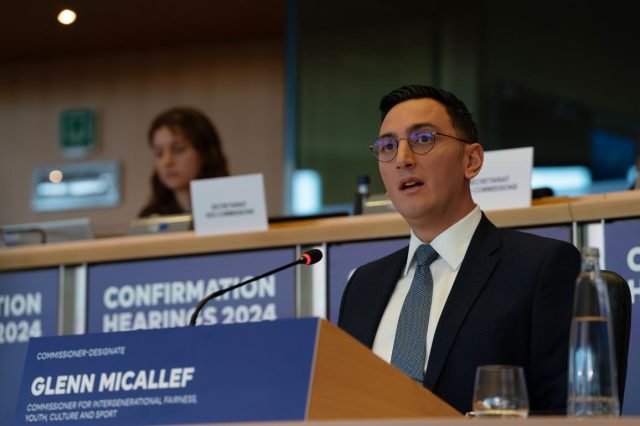
The young Maltese socialist Glenn Micallef is the Commissioner-designate for Intergenerational Fairness, Youth, Culture and Sport. When asked by the European Parliament about his general competence, European commitment and personal independence, he stated in writing that the point of departure of the new Commission’s work in the area of culture will be the “Cultural Compass”, a vision for the sector and comprehensive strategic framework to guide and harness the multiple dimensions of culture.
The cultural and creative sectors and industries contribute almost 4 per cent to the European Union’s gross domestic product and provide around 8 million jobs. Mr. Micallef has committed to improving the professional and social conditions of artists and creative workers in the cultural and creative sectors, as well as to launch a European artificial intelligence strategy for the cultural and creative sectors and industries, with the aim of ensuring that artificial intelligence enables and reinforces human creativity rather than replace human beings.
In terms of public financing, Creative Europe is the main programme supporting cultural cooperation projects and cultural networks, with a current budget of 2.44 billion euros for the period 2021-2027, dedicated to the culture and audiovisual sectors; the European Capital of Culture (this year located in Bad Ischl, Austria) is financed through Creative Europe. Creative Europe, created in 2014 (with a budget of 1.47 billion euros for the period 2014-2020), further finances other 430 projects, 2000 organisations and 39 countries, therefore not just Member States, but also beyond.
Creative Europe addresses the strands of culture and media. Culture includes, in particular, architecture, cultural heritage, design, literature & publishing, music and performing arts.
Within those subsectors, Creative Europe co-finances 37 networks, such as the European Council of Interior Architects, the Architects’ Council of Europe, the European and International Booksellers Federation, Culture Action Europe, Trans Europe Halles, the European Network of Cultural Centres, the European Festivals Association, the Euro-Mediterranean Network for the Professional Development of Young Artists, the European Union National Institutes of Culture, the European Creative Hubs Network, the European Network on Cultural Management and Policy, On-The-Move, Reset!, Culture Next, the International Music and Media Centre, Europa Nostra, the European Route of Industrial Heritage, the Network of European Museum Organisations, Future for Religious Heritage, the World Crafts Council of Europe, the European Association of Conservatories, Music Academiies and High Schools of Music, the European Music Exporters Exchange, the European Early Music Network, Europea Jazz Network, Jeunesses Musicales Internationale, the European Composer and Songwriter Alliance, the European Choral Association, the European Network for Live Music Associations, or the Independent Music Publishers International Forum.
On top of the Creative Europe flagship, there are twenty other Union funding instruments which support culture as a horizontal policy field. It remains to be seen what the quantitative budget for such instruments will be in the new Multiannual Financial Framework, which will be discussed in 2026.
On 4 November, he further appeared before the European Parliament to respond to questions asked by individual Members. In his introduction, he described his future “Culture Compass” a means to harness and connect culture’s multiple dimensions with the Commission’s broader political priorities.
Culture features now in twenty policy areas and in the twenty-one mentioned funding instruments, so the Culture Compass would ensure higher effectiveness through coordinated action, objectives and monitoring tools.
He also developed his approach to artificial intelligence, announcing that he will formulate an artificial intelligence strategy for the cultural and creative industries, together with the Executive Vice-President for Tech Sovereignty, Security and Democracy.
When it comes to the working conditions of artists, he explained that the ongoing assessment on the situation in various Member States will inform the discussion in Brussels, in order to identify potential regulatory gaps.
Source of image: European Parliament



 Subscribe
Subscribe